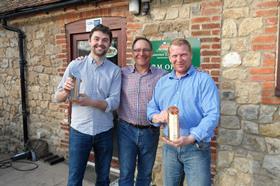
Attempting to counter ongoing price deflation in the retail salads sector, one Kent grower has seen potential in its own-brand bagged salads line, supported by better baby leaf varietal development and a newly-developed imports business.
LJ Betts, based in West Malling, also recently invested £2.5 million in a new cold store and packing facility, allowing it to produce a more consistent product and provide a base for future growth.
As well as supplying wholehead and baby leaf into retail and foodservice via two major processors, accounting for 60 per cent of its business, the company has a burgeoning own-brand business supplying local wholesalers, farm shops, London wholesale markets and independent foodservice outlets.
Encouraged by the demand and local recognition of the Betts’ brand, the company recently began small volumes of baby leaf imports from Italy and Spain during the winter months. Local traders and businesses responded well to the offer of year-round supply, and the company saw imports double in volumes during the second year.
“Last winter was the second time we imported baby leaf, and volumes almost doubled from the year before, so we’re quite excited about this year, and we’re expecting to see some growth,” says assistant farm manager, Adam Lockwood. “The main thing for us to watch is keeping the momentum going from the summer, and manage the crossover to imports in terms of quality, so then you don’t have to start from fresh.”
Winter imports of spinach, rocket and other coloured baby leaves are reserved for the own-brand range, Lockwood adds, while the processing business currently terminates with the end of the English season.
Lockwood explains that, in the context of a challenging retail environment and a race to the bottom on prices of commodity salad lines such as iceberg and spinach, the company likes to keep a broad crop portfolio. Iceberg remains one of the company’s biggest wholehead lettuce lines, along with Romaine, Little Gem, continental lettuces such as Lollo Verde, Lollo Rosso, Green Batavia, and multi-leaf wholeheads such as Apollo and Butterhead Salanova. On baby leaf, it produces baby kale, spinach, wild rocket, land cress, mizuna, baby red lettuce, red chard, bull’s blood, and a few others.
“The price war hasn’t affected our own-brand side of the business, but on the factory-supply side, there is definitely a lot of pressure on price. That’s why we like to have a spread of crops. Our own-brand bagged baby leaf is a big area of growth for us,” he adds.
Lockwood believes that although multi-leaf wholeheads have been in fashion recently, driven by the appeal of the stronger wholehead leaf combined with the ease of needing only one cut to separate leaves, suppliers are slowly reverting to their preference for baby leaves.
“Multi-leaves have been in fashion recently, but now we are seeing a reversion back to baby leaf,” he explains. “This might be down to the processing costs, as there is a cutting process involved, but there is also lots of exciting development in baby leaf. Generally, multi-cut leaves were much stronger, but seed companies are working on the strength of baby leaves, and there are now some really strong-leaved varieties available.”
This was the first summer the company used its new packing facilities for the English crop, after completing them last October, and Lockwood says the season has seen fairly stable growing conditions and strong demand. “It’s been a good year on the salad front, up until mid August, as recently it’s been quite difficult as there’s been a lot of rain,” he says. “Demand has been good, and we’ve not been missing plantings or drillings too often since February, which is good as the minute you start missing days you end up with gaps in availabilities.
“Baby leaf has been the big area of growth over the last three to four years, whereas wholehead has been relatively stable. At the moment, the word is that this growth is set to continue.”



